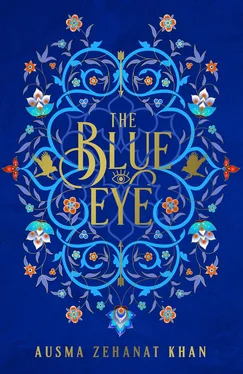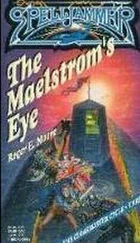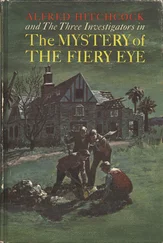1 ...8 9 10 12 13 14 ...20 Arian gave her name. After a pause, she added, “First Oralist of Hira.”
Another murmur, different in tenor than the first. It held a tinge of fear in it.
Arian observed the thick leather belts that cinched the cloaks these men wore. Each belt was inscribed with the words Over this are Nineteen .
She pondered the significance of the nineteen men who surrounded them; perhaps they were the commanders of the army at their back. If the man in the burnoose was the leader of the Nineteen, then the man at his side must be his lieutenant. His stance was poised, his hand holding an iron glaive, a staff with a blade that curved up at shoulder height, just above a spike that pointed outward. The lower half of the glaive was overlaid with damasquinado, a pattern of gold incised on black steel, in contrast to the naked shaft.
The man who held it glanced at Arian’s circlets, then looked up to meet her eyes.
She suppressed a shiver. Though the temperature had fallen, it wasn’t the night that chilled her. It was the man’s gaze—amber eyes with stiletto-sharp flecks of blue and green. He held himself like a weapon, lethally honed and muscled, with an air of quiet command. His leather belt carried a complement of knives, each with a jeweled haft, as if he specialized in killing, and each of the blades he’d chosen was dedicated to a task. Beneath his cloak, he wore a fitted uniform in a color that echoed the sienna of the desert. He watched Arian with a focus that warned her he wasn’t an ordinary soldier.
He was a killer who looked at her like prey.
The man in the burnoose held one hand high to dismiss the soldiers on the dune.
“Gather the horses; return to camp.”
The men who remained fanned out around what was left of Arian’s group to the sound of horses’ hooves behind them. To distract them from her attempted theft, Arian said, “I would welcome the courtesy of your titles.”
The older man spoke first. “Shaykh Al Marra.” He indicated the man with the glaive. “This is Sayyid Najran, my second.”
Arian considered their style of dress. Their headcloths were native to the tribes of the Empty Quarter who made their home in the boundless sands of the Rub Al Khali.
“You are far from your homes, then. What brings you here?”
“What brings you here, sayyidina? You have traveled far from Hira at some risk to yourself.” It was a reasonable question, but it was also a dismissal of Khashayar’s escort, the Shaykh’s shrewd black eyes measuring the impact of his words.
Arian looked over her shoulder to the vanguard of the Nineteen. “And you have brought an army from the Rub Al Khali to the capital of the Black Khan.”
The sayyid planted his glaive in the sand, startling her.
“Is the Black Khan your ally, sayyidina? A pity then, to send his men home to him without their heads.”
His voice rasped like sand over stone, and she tried not to wince at the words. With the party of Zhayedan she’d had as her escort, she could hardly refute his claim. But she could try to temper it.
“The Black Khan is not my enemy, at least.” She made an effort to soften her voice, using a dialect familiar to their ears, rather than the Common Tongue. “Neither are the people of the Rub Al Khali.”
A nod of appreciation from the Shaykh. “Yet it is not a friend who comes like a thief in the night after the Marra’s horses.”
She understood that he referred to the people of his tribe, and not solely to himself. She was on dangerous ground: she couldn’t justify the theft without giving some hint of her journey. So she used a well-known proverb to pay tribute: “The horses of Al Marra are as numerous as the sheep of Awazim.”
Najran’s riposte was knife-edged, a dagger shearing silk. “That doesn’t give you the right to take them.” He took a step forward, then in a gesture of unthinkable familiarity, he covered her circlet with his palm, his fingers tracing its script. “The First Oralist of Hira should know the penalty for theft.”
Khashayar struggled against the men who held him.
“Kill him,” Najran said.
“No!” Arian cried. “Wait! Tell me the penalty you speak of.”
Najran’s cool fingers trailed down Arian’s arm to her wrist. The contact left her shaken; the Claim she harbored in her deepest self recognized that the danger he represented was something new, the aura of death around him so pervasive that she felt it sink into her bones. And yet his touch was an affront—to both the First Oralist and the woman, awakening her anger.
“Your hand, sayyidina.” His hand closed over her wrist, as he fingered the emerald dagger. He moved close enough for her to count the flecks in his eyes. The green flecks had spread … they were glowing … just as his emerald dagger began to throb with light. She could feel the heat of the dagger, stark coldness from the man himself.
Wafa let out a whimper, but Arian held her ground.
“What law commands the loss of my hand, sayyid?”
His headcloth brushed her ear. “Shall I show you the verse of the Claim?”
She shifted the tiniest fraction closer to Sinnia, touching Sinnia’s circlet with her own.
“ Could you?”
She was well aware that he couldn’t. No one could, save for the One-Eyed Preacher, who now possessed the Bloodprint. When the flecks of green in his eyes faded, the light from his dagger dulled, and she knew her guess had been correct.
But it likely didn’t matter—she recognized the echoes of the One-Eyed Preacher’s law, a code proclaimed by the Talisman. It seemed it was now the code of the Rising Nineteen as well.
She faced the Shaykh, buoyed by her bond with Sinnia.
“A boon that is granted to Hira will be remembered. My need for transport was urgent, and I feared my escort would not meet with your approval.” Then, to Najran: “The law of the people of Marra does not sanction aggression. Yet here is your army, ready to begin hostilities. What should be the penalty for that, I wonder?”
The words seethed with scorn at the hypocrisy of the sayyid’s application of the law. She caught sight of Wafa’s frightened face. She could sense his confusion, made all the more apparent when he whispered to her in the dialect of Candour, “Make them sleep. Let’s take the horses and go.”
She couldn’t take that risk. She knew more about the Nineteen’s facility with the Claim than Wafa did. It might turn out to be disastrous to test her skills against the Nineteen’s commanders at once.
The Shaykh jerked Wafa close, ignoring his panicked yelp. Holding him by the chin, he examined Wafa’s face.
“Najashi I know. Talisman I know. First Oralist I know. This I do not know.”
“Hazara,” Arian answered. “A noble tribe of Candour.”
The Shaykh’s eyes flicked to Khashayar. His rugged features hardened.
“The Zhayedan’s man stands no chance. But grant us the boy and I will gift two of my horses to the Negus. If that is where your journey takes you.”
An unexpected opportunity presented itself, an advantage she had to seize. Arian stilled Wafa’s struggles by raising her hand. “Yes. The Companion Sinnia returns to pay her respects to the Negus.” She spread her hands. “But I cannot give you the boy. He is my ward. He is under Hira’s protection.”
She didn’t mention Khashayar. She would have to try to save him by stealth.
The Shaykh held on to Wafa. “What would you give, then? For safe passage across the Rub Al Khali?”
Pain struck her heart at this echo of her journey through the Cloud Door. Daniyar had offered the book of the Guardian of Candour to the Lord of the Wandering Cloud Door in exchange for safe passage through the Ice Kill.
Читать дальше












